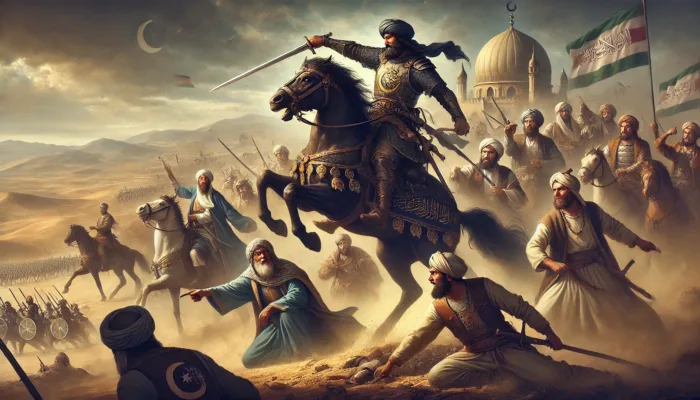Table of Contents
Introduction
The tenth article in the “Era of the Rightly Guided Caliphs” series focuses on the different forms of heroism demonstrated during the Islamic conquests. It highlights three main types of heroism: military heroism, political heroism, and psychological warfare. Each type is explored through historical examples, shedding light on the bravery and strategic brilliance of the Islamic heroes of that time. Click here to explore the full series.
Heroism in the Early Islamic Conquests: Military, Political, and Psychological Triumphs
Nations are built on the shoulders of their heroes. No civilization, state, or nation has ever risen to greatness without a defining war or a struggle for liberation. The generation that establishes a nation is always the strongest, most resilient, and most devoted to its ideals. The heroic deeds of these founding generations are often the most cherished chapters of a nation’s history, and their stories of sacrifice and triumph are remembered for centuries.
During the era of the Rightly Guided Caliphate, which marked the dawn of the Islamic Caliphate, there were countless acts of heroism carried out by the early Muslim conquerors. These individuals spread Islam far and wide, extending its reach from the East to the West, and achieving remarkable successes. This is a topic vast enough to fill many volumes, yet in this article, we aim to provide a brief glimpse into some of these heroic acts.
While heroism is often discussed in terms of military battles and warfare, we will focus on three important forms of heroism:
- Military heroism
- Political heroism
- Psychological warfare
To illustrate these aspects, we will turn to one well-known example, frequently cited in books, programs, and media. While the biographies of early Muslims are filled with heroic tales, let us begin by reflecting on the story of Hashim ibn Utbah ibn Abi Waqqas, a figure whose contributions are celebrated across many narratives.
Hashim ibn Utbah: The Swift Hero of Two Epic Battles
Hashim ibn Utbah ibn Abi Waqqas became widely known as the “lion wrestler”, but his heroism extended far beyond this nickname. He was a remarkable figure in Islamic history, often referred to as Al-Mirqal, meaning “the swift one”, a name that reflected his unparalleled speed in battle. The Arabs used the term raqalat to describe swift camels, and Al-Mirqal symbolized that same swiftness.
A large and formidable man, Hashim was skilled and experienced in battle. Lady Aisha (may ALLAH be pleased with Her) praised him by saying, “This is a man whose mount never falters“, highlighting his exceptional control over his war equipment, especially his mounts, which were crucial to the warriors of that time. Hashim was also among the famous one-eyed figures in Islamic history, having lost his right eye during the Battle of Yarmouk.
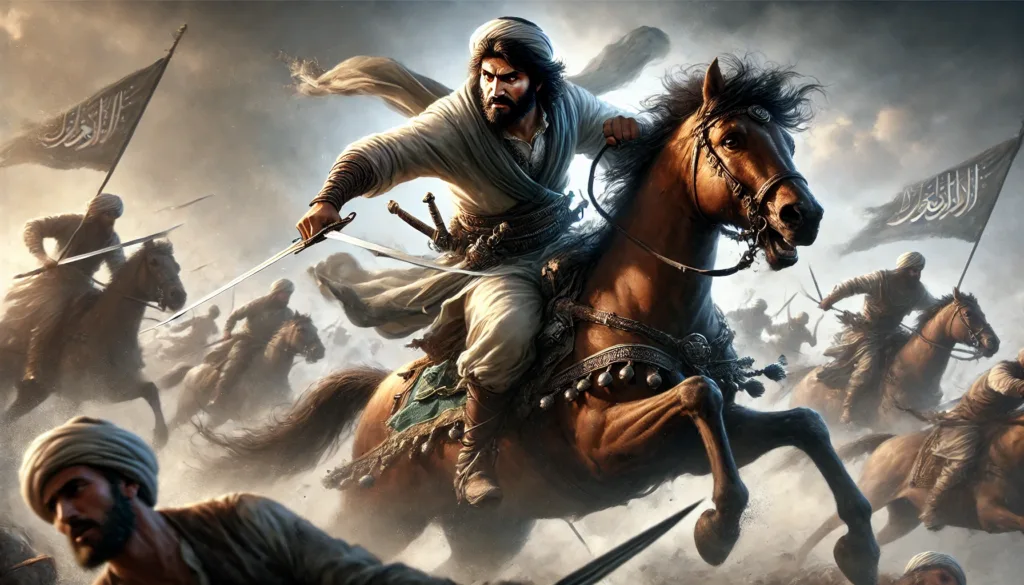
Hashim ibn Utbah’s heroism was not limited to one battle; he participated in two of the most decisive confrontations in the early Islamic conquests: the Battle of Yarmouk against the Romans and the Battle of Qadisiyyah against the Persians. The Islamic conquests began on the Persian front, but under the leadership of Abu Bakr, Khalid ibn Al-Walid was sent with half the army—around nine thousand men—to fight on the Roman front. Khalid led the Islamic forces in the conquest of the Romans, with the Battle of Yarmouk standing out as one of the most important victories.
After the victory at Yarmouk, Khalid remained on the Roman front, while the army returned to support the battle against the Persians. Hashim ibn Utbah, who had lost his right eye at Yarmouk, assumed command of the army as it prepared to rejoin the Persian front. He placed Al-Qa’qa ibn Amr Al-Tamimi, another renowned hero, at the head of the vanguard of the returning forces.
The arrival of this army at the Battle of Qadisiyyah, already underway, provided a much-needed boost to the morale of the Muslims and demoralized the Persians. The strategy of psychological warfare played a key role in the arrival of reinforcements. Al-Qa’qa, with his vanguard, divided his forces into groups, each raising dust to signal the arrival of reinforcements. This tactic was repeated by Hashim when his army arrived, joining the existing Muslim forces in waves. Each new group brought fresh energy and strengthened the resolve of the Muslims, while simultaneously diminishing the spirits of the Persians.
Hashim ibn Utbah: The Lion Wrestler and Conqueror of the Persian Empire
Hashim ibn Utbah displayed remarkable leadership and bravery at the Battle of Qadisiyyah, and later, as the commander of the army that advanced toward Al-Madain. The Persian conquests were marked by three key battles: the Battle of Qadisiyyah, the conquest of Al-Madain— the capital of the Persian Empire— and the capture of Jalula, where the last remaining Persian military forces had gathered.
As the commander leading the army toward Al-Madain, Hashim ibn Utbah found the Persians in a defensive position. During one of the skirmishes, the Persians unleashed a lion from King Khosrow’s private zoo. The lion was a new and fearsome weapon, and its appearance on the battlefield posed a real threat to the morale of the Muslims. Had it not been for Hashim ibn Utbah’s bravery, the lion could have caused significant disruption, perhaps even scattering the Muslim ranks at this critical moment.
With exceptional courage, Hashim dismounted his horse and confronted the lion in hand-to-hand combat. Armed only with his sword, he fought the beast and ultimately killed it. This act of heroism earned him the nickname “the lion wrestler”, a title that became a symbol of his unmatched valor. The death of the lion greatly boosted the morale of the Muslim forces, while the defenders of Al-Madain were left shaken and demoralized. Following this victory, Al-Madain fell into Muslim hands.
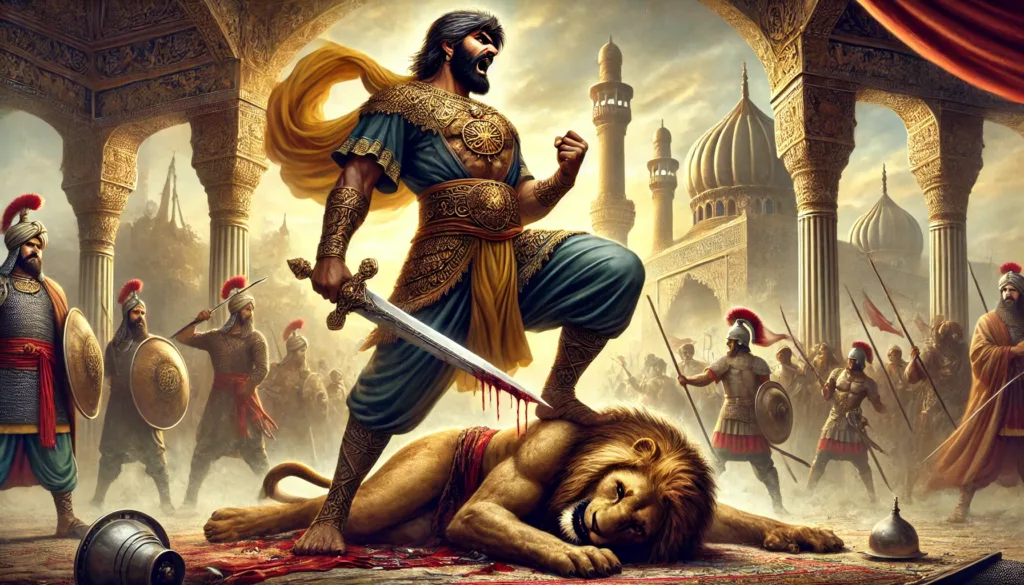
Hashim ibn Utbah continued his pivotal role in the campaign, leading his forces into the heart of Persia and eventually advancing to Jalula. With the conquest of Jalula, the final stronghold of the Persian Empire was overcome, and the empire itself was brought to an end.
The Dual Role of Heroism: Military Bravery and Political Strategy in the Early Islamic Conquests
This is just one example of the military heroism displayed by the early Muslim conquerors, and history is rich with many more such stories. However, the aspect of heroism we want to emphasize—one that is often overlooked—is the political dimension. The truth is, politics cannot be separated from warfare. Through intelligence, wisdom, and strategy, a skilled politician can often avert conflicts, preventing unnecessary bloodshed and saving the lives of many.
It is true that a politician’s influence is meaningless without the backing of military forces, and that negotiation is impossible unless one is capable of engaging in battle. But political skill plays a vital role in easing the burden on fighters and preventing unnecessary conflict. No nation has ever risen to greatness without combining both military strength and political acumen. The two are inseparable, much like the wings of a bird: a nation cannot rise through politics alone, nor through power alone. Both must work in harmony for a nation to thrive.
Rib’i ibn Amir: A Symbol of Unyielding Resolve and Strategic Diplomacy
One of the most significant moments to highlight in this context is the story of the ambassadors the Muslims sent to the Persians before the Battle of Qadisiyyah. Saad ibn Abi Waqqas, the commander of the Muslim forces at Qadisiyyah, wanted to follow the established approach in Muslim conquests and send ambassadors to Rustam, the Persian general at that time, to explain the message of Islam. To carry out this mission, he selected three men: Rib’i ibn Amir, Hudhayfah ibn Mihsan, and Al-Mughirah ibn Shu’bah. As it would soon become clear, all three were highly intelligent and skilled in presenting their message.
However, Rib’i ibn Amir had a different approach in mind. He suggested that sending three ambassadors at once would give the impression that the Muslims were overly concerned with the Persians, when in fact, the message should be one of strength and self-assurance. Rib’i proposed that only one ambassador should go, followed by another, and then the third. Saad, recognizing the wisdom in this suggestion, agreed to change the plan, and Rib’i ibn Amir was sent first.
Rib’i’s appearance upon arriving in the Persian camp was striking. He was a disheveled, dust-covered warrior, his clothes rough and his sword’s scabbard made of simple cloth, rather than leather. This rugged and unrefined appearance was intended to convey an image of a warrior who had little concern for material display. The Persians, in contrast, had created an extravagant visual spectacle around him, likely hoping to instill a sense of cultural shock and psychological defeat, a tactic often used when attempting to intimidate or humiliate an outsider. But Rib’i ibn Amir (may ALLAH be pleased with him) was not one to be intimidated by such displays.
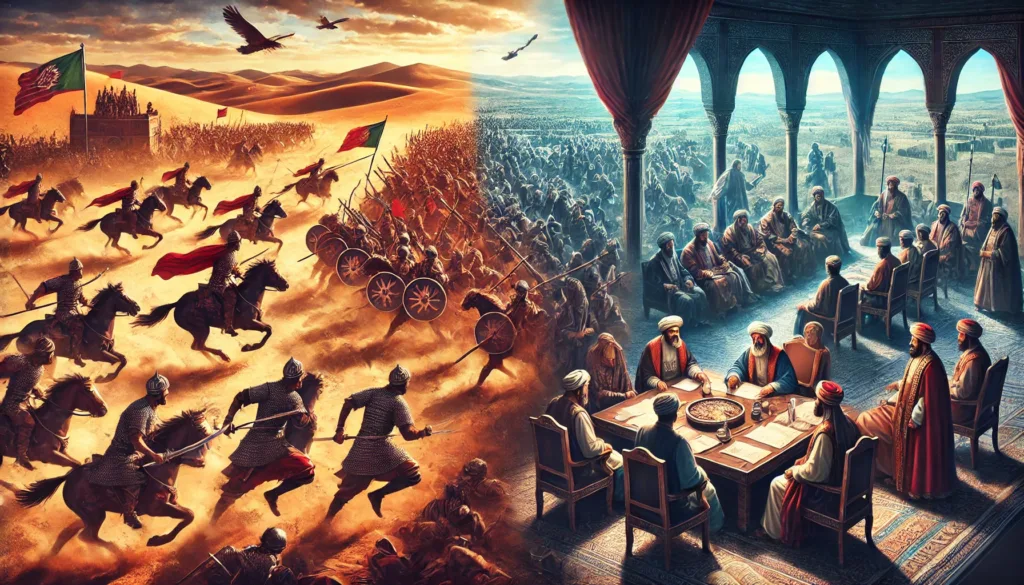
As he entered the Persian camp, he disregarded the lavish decorations and cushions laid out for him. Instead, he took one of the cushions, tore it, and used it to tie his mule at the entrance of the royal tent. Carrying his sword and shield, he continued walking, tearing through the luxurious carpets and pillows that had been carefully arranged to impress him. His indifference to their splendor was a clear statement of his own unshakable resolve.
The Persians, irritated by his actions, tried to remain indifferent, but the message was clear: the Muslims were neither intimidated nor concerned with their material displays of power. Rib’i ibn Amir continued undeterred until he reached Rustam’s seat, where his presence alone had already begun to convey the strength and conviction of the Muslims.
Rib’i ibn Amir: Master of Diplomacy and Psychological Warfare in the Face of Persian Power
As Rib’i ibn Amir stood before Rustam, the Persian general’s guards immediately moved to push him away from the royal seat. Unfazed, Rib’i sat down on the ground, discarding the cushions they had offered him. Rustam, intrigued, asked, “What brought you here?” Rib’i’s response was simple and direct: “We are a people who do not prefer sitting on your decorations like these”. Rustam, sensing the weight of the moment, asked again, “What brought you? What do you want from us?” Rib’i answered calmly,
“We are a people whom ALLAH has sent to bring whoever HE wills from the worship of servants to the worship of ALLAH, the LORD of servants, from the constraints of this world to its vastness in both this life and the hereafter, and from the injustice of religions to the justice of Islam. Whoever accepts our message, we stand with him. Whoever refuses, we offer him the option of paying the Jizyah in return for our protection. And whoever rejects, we fight him until we fulfill ALLAH’s promise”
Rustam, curious but cautious, asked, “And what is ALLAH’s promise?” Rib’i responded with clarity:
“Paradise for those who die in this cause, and victory for those who live”
Rustam, now feeling the weight of the encounter, said, “This is a matter we need to consult our elders about”. Rib’i, aware of the tactics of delay, responded, “How long will you need? A day or two?” Rustam, perhaps searching for a way to postpone the inevitable, replied, “No, but until we can write to our elders and consult them”. Rib’i, knowing the importance of swift action, retorted,
“What our Prophet (Peace be upon Him) commanded us, and what has become the custom of the caliphs, is that we do not allow our enemy control over our time—meaning we don’t allow lengthy negotiations that only weaken the resolve of the fighting nation—We give you three days, and I am personally guaranteeing this among my companions”
Rustam, puzzled, asked, “Are you their leader?” Rib’i answered,
“No, but the Muslims are like one man. Their protection is one, their hand is one, their blood is equal, and they stand united against all others”
Rib’i’s words created a profound psychological impact on Rustam. The Persian general, trying to avoid war, turned to his officers and asked, “Have you ever heard a speech clearer than this? More direct?” Some of his men, not understanding the significance of Rib’i’s message, responded with disdain, “God forbid that you leave your religion for this dog! Look at his clothes!” Rustam, however, admonished them: “You are fools! Don’t judge by appearances—look at the speech, not the clothes”.
On the second day, Hudhayfah ibn Mihsan arrived, and by the third day, Al-Mughirah ibn Shu’bah entered the Persian camp. Al-Mughirah, echoing Rib’i’s actions and message, tried to sit beside Rustam, but the guards again prevented him. Undeterred, Al-Mughirah spoke with even greater force. With piercing words, he said,
“We used to hear about your wisdom, but now I see no people more foolish than you! Among the Arabs, we are equals. None enslaves another unless at war with him. I thought you treated your people as equals, as we treat each other, but now I see that some of you are lords over others. If this is how you operate, it would have been better to have told me that this is how things work here, so we would have known. I didn’t come to you, you invited me. Today, I have learned that your kingdom is on the decline. No kingdom can stand on conduct like this, nor on minds such as yours”
In this way, the Muslims’ performance in politics was as heroic as their achievements in battle.
Amr ibn Al-As: The Political Strategist Who Outwitted Roman Rulership
The second example of political heroism we highlight involves the interaction between Amr ibn Al-As (may ALLAH be pleased with him) and Artabun (Theodore), the ruler of Jerusalem. When the Muslims laid siege to Jerusalem and had already conquered much of the Levant, Amr ibn Al-As was the leader of this military operation. However, the responses he was receiving from Artabun’s messengers were not revealing enough about his true intentions.
Recognizing that he couldn’t grasp the full situation from messages alone, Amr ibn Al-As decided to meet Artabun face to face. When he entered, Artabun quickly realized that this was no ordinary ambassador. He suspected that the man before him was Amr ibn Al-As himself. Artabun, recognizing the strategic importance of Amr, said, “By ALLAH, I would not have achieved against these people what I have achieved if I had killed him”. Convinced that Amr ibn Al-As was a key figure, Artabun ordered one of his soldiers to assassinate him upon his return.
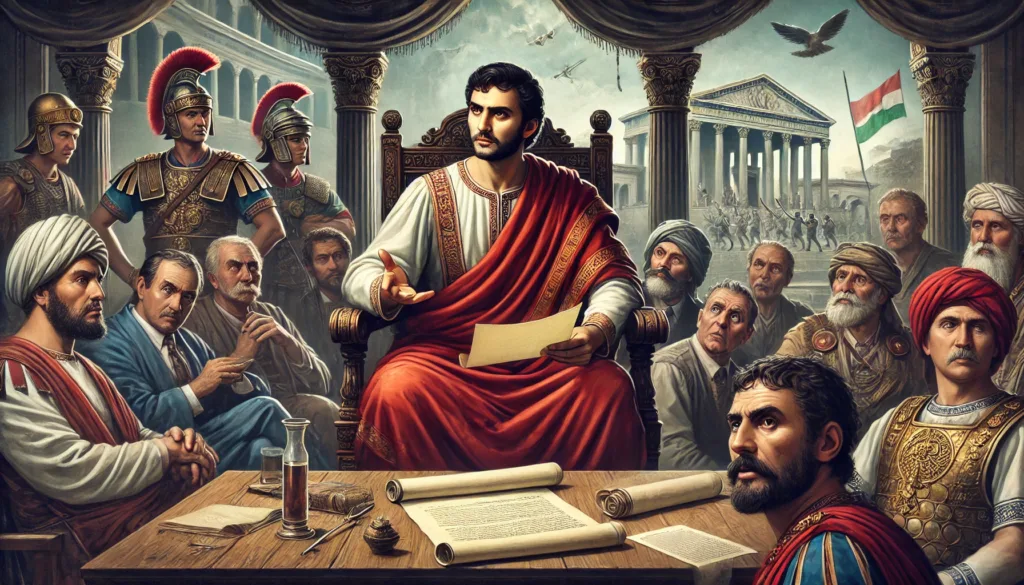
Amr ibn Al-As, sensing the danger, was quick to act. In his final words to Artabun, he said,
“O King, I have heard from you and you from me, and your words have impressed me. I am one of ten men whom Umar ibn Al-Khattab sent to Amr ibn Al-As, so that we might be with him on his command. If you accept, I will bring them all to you tomorrow, to hear from you as I have heard. If they all agree on an opinion, Amr ibn Al-As will not oppose it“
Artabun, sensing that the situation could become far more complicated and that the potential consequences were greater than he had anticipated, decided to call off the assassination. He ordered his soldiers to cancel the plot. Thus, Amr ibn Al-As narrowly escaped.
When this news reached Umar ibn Al-Khattab (may ALLAH be pleased with him) he remarked: “We have thrown the Artabun of the Romans with the Artabun of the Arabs“.
Psychological Warfare in the Islamic Conquests: Khalid ibn Al-Walid’s Tactical Brilliance
Now, let us turn our attention to the matter of psychological warfare, which played a crucial role in the Islamic conquests. Psychological warfare is an essential tactic that every fighter and leader must understand, as it can save countless lives and resources by weakening the enemy’s will to fight. One of the most prominent figures in military psychological warfare was Khalid ibn Al-Walid (may ALLAH be pleased with him). His approach was centered on creating psychological shocks during combat, which often led to victories that would have been unimaginable based on sheer military strength alone.
One notable example of Khalid ibn Al-Walid’s psychological warfare can be seen during the Battle of Yarmouk. Khalid (may ALLAH be pleased with him) had previously faced the Roman military commander appointed by Heraclius, the Emperor of Rome. Heraclius, in an effort to trap the Muslim forces and prevent any retreat, had instructed his commander to position his soldiers in a wide open space with a narrow exit. The aim was to force the Muslims into battle while leaving no room for retreat.
Additionally, to ensure that his troops would not flee or withdraw, some units of the Roman infantry were chained together, further tightening the pressure on their forces and making it more difficult for them to escape or regroup during the fight.
Despite the overwhelming numerical disadvantage—where the Muslims numbered only thirty-three thousand, while the Romans had two hundred and forty thousand—Khalid’s leadership and tactics ensured that the moral strength of his army remained intact, while that of the Roman forces faltered.
Before the battle, a Roman commander named George requested a private meeting with Khalid. When they met, George asked Khalid directly: “O Khalid, be truthful with me and do not lie, for a free man does not lie, and a noble one does not deceive. Did ALLAH send down a sword to your Prophet and give it to you?” Khalid replied, “No“. George then asked, “Then why were you called the Sword of ALLAH?”
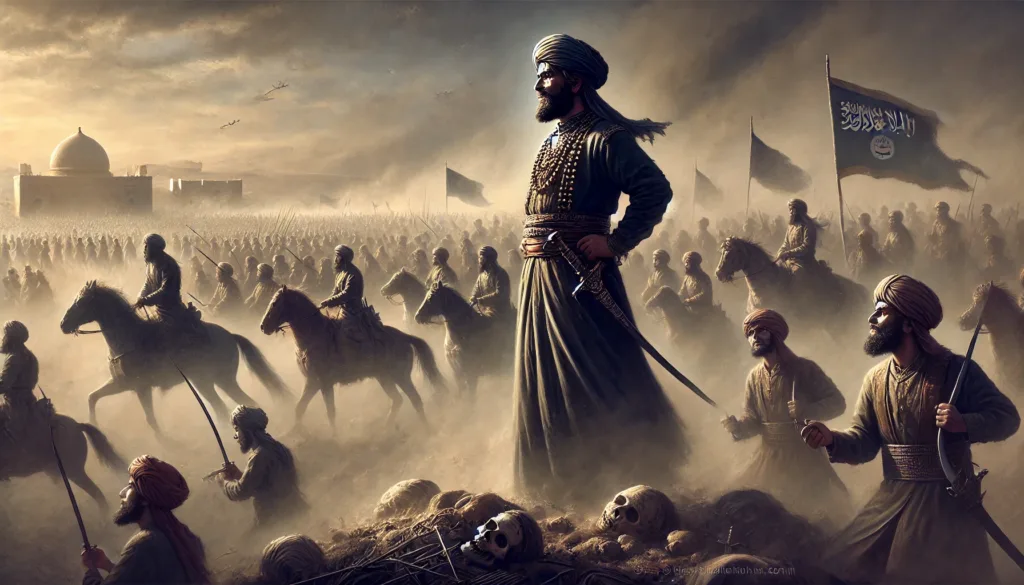
In response, Khalid shared his personal story of conversion to Islam, his initial reluctance to embrace the faith, and eventually his decision to fight for Islam in Jihad. This honest and humble response from Khalid had a profound impact on George. He was so moved by Khalid’s sincerity that he converted to Islam and joined the Muslim ranks. This conversion not only bolstered the morale of the Muslims but also deeply affected the resolve of the Roman army.
Khalid ibn Al-Walid’s Tactical Genius: Turning the Tide of Battle Through Strategy and Resilience
Khalid ibn Al-Walid’s battle plan was a masterstroke of strategy and foresight. The Romans, with their massive numbers, had positioned themselves in a place with a wide entrance but a narrow exit. The Muslims, on the other hand, approached from the exit side, blocking the Romans’ retreat and effectively trapping them. As soon as Amr ibn Al-As observed this, he exclaimed, “ALLAH is Greatest! The Romans are besieged, and no besieged people ever come to good“.
With this advantage in place, Khalid began to put his plan into action. Aware of the Roman cavalry’s overwhelming strength, he knew that an equal confrontation between their cavalry and the Muslims’ would spell disaster for the Muslim forces. Instead, Khalid decided to use the psychological edge to his advantage. He positioned the Muslim cavalry behind the infantry, ensuring that when the battle began, the Roman cavalry would rush in, eager to attack. The Muslim infantry would absorb the initial blow, and once the Roman cavalry was drawn into the battle, Khalid knew the time would be right to strike.
Khalid’s instructions to his army were simple yet vital: patience and steadfastness. The Muslim forces were to endure the Roman cavalry’s onslaught, waiting for the moment when the cavalry’s advance would create a gap between them and the rest of the Roman army. This was when Khalid planned to unleash the Muslim cavalry, turning the tide in their favor.
As the battle unfolded, the Roman cavalry moved forward and launched a fierce attack. They managed to break through the Muslim right and left flanks, pushing so far that they reached the tents where the women were stationed. This was exactly as Khalid had anticipated: after the initial shock of the Roman assault, the Muslims began to recover, and the women, who had been waiting for this moment, joined the fray, striking back at the Romans.
Mastering the Battlefield: Khalid ibn Al-Walid’s Strategic Manipulation of Roman Forces
At the moment the separation occurred between the Roman cavalry and infantry, the Muslim cavalry emerged, catching the Romans by surprise. This was an element they had not anticipated. The shock of the initial Roman cavalry charge had been absorbed by the Muslim infantry, despite their flanks briefly collapsing, and now the separation between the two forces had created a pivotal moment.
Khalid ibn Al-Walid, recognizing the Roman cavalry’s disarray, allowed them a brief opportunity to retreat. He opened a path, giving them space to withdraw from the battle. As the Romans retreated, the Muslim cavalry advanced once again. For the Roman soldiers, this shift was startling: they witnessed their own cavalry retreating without returning, while the Muslim cavalry pressed forward. The psychological impact was immense, causing confusion and disrupting the coordination between the Roman infantry and cavalry. This disarray led to the Roman forces beginning to fall back in disorganization.
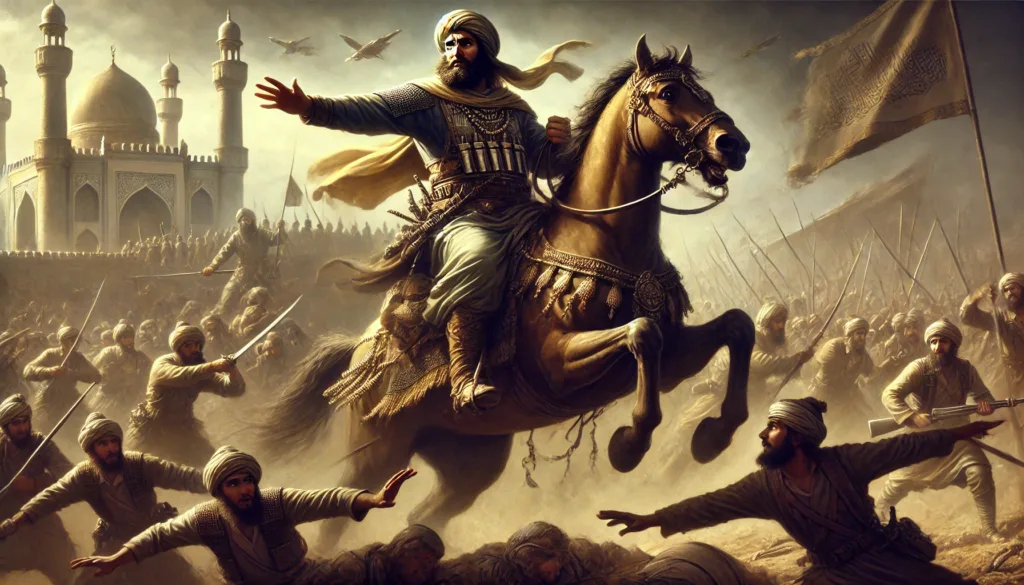
The situation grew worse for the Romans as the day wore on. The sun was setting, casting a fog over the battlefield, and the pressure from the Muslim forces intensified. Adding to their troubles, the Roman infantry was bound together in groups, and as some units began to retreat, they inadvertently pulled others with them. The Romans found themselves retreating toward a precarious position: a place surrounded by water and overshadowed by a high hill. As the Roman soldiers fell back, some found themselves tumbling into the water below, further compounding their already dire situation.
The Legacy of Islamic Military Strategy
Through this strategy, which hinged on psychological shock, the Muslims were able to defeat the formidable Roman army at Yarmouk. This victory marked a turning point, as the defeat of the Roman forces opened the Levant to Muslim control—a region that has remained part of the lands of Islam ever since.
The key takeaway is that nations rise on the strength of their heroes. Heroism, however, is not limited to the battlefield. True heroism encompasses military bravery, political leadership, and psychological warfare.
I ask ALLAH, the Blessed and Exalted, to teach us what benefits us, to benefit us with what HE has taught us, and to increase us in knowledge.
Sources:
- Mohamed Elhamy. محمد إلهامي | عصر الخلافة الراشدة | 10. من بطولات الأوائل. YouTube Video.

